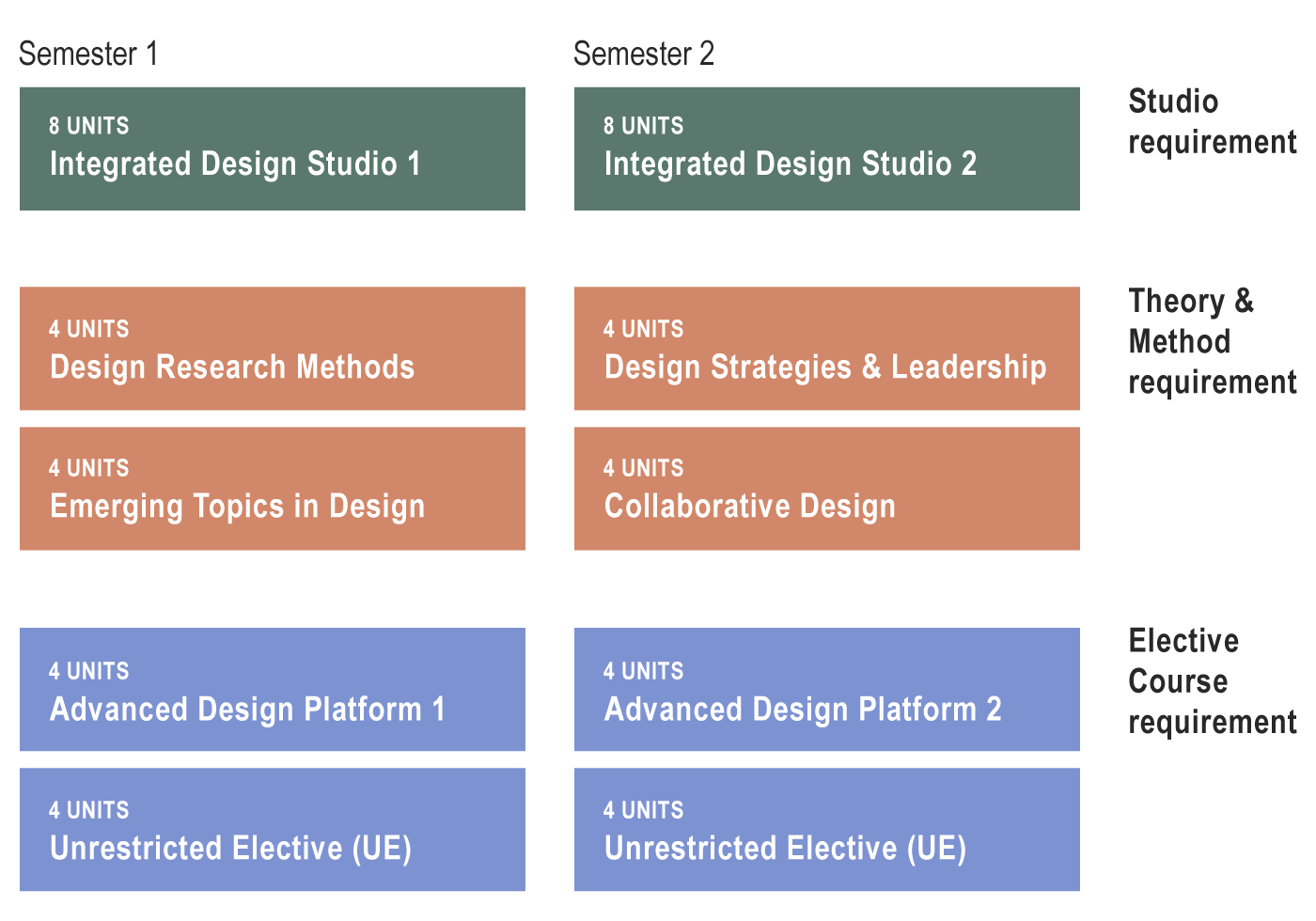Programme Structure
Studio-based activities follow a hybrid model in which half the studio experience will be in the Division of Industrial Design working with world-class design educators. The other half will be spent working on-site in the design studios of our corporate collaborators. In this situation, you’ll have the opportunity to work hands-on with our corporate partner’s design teams and the various stakeholders that will be involved in projects assigned to you.

Your academic experience is complemented with studio-based activities via our Advanced Design Platforms that engage in concepts such as product innovation, social and service transformation, design futures, design thinking, co-design, user interaction and experience, artificial intelligence, data visualisation, and communication. Depending on your direction or focus, you will have the choice of elective courses from the entire NUS academic catalogue to round out your studies.
Integrated Design Studio 1 and 2
8 units each (ID5001 and ID5002)
The Integrated Design Studio sequence offers a unique hands-on learning experience. In collaboration with an industry partner, students will work in small, interdisciplinary teams to solve a variety of real-world, in-context problems. Students will be guided in partnership with faculty members with relevant industry experience and members of the industry partner’s design and leadership teams. Each semester is led by different instructors, bringing a range of perspectives to the students, focusing on project briefs from a range of domains.
Design Research Methods
4 units (ID5352)
To propose good solutions, designers need to first make sense of the complexities of the situation they are designing for. This includes understanding the context they are designing for, including the people, objects, environment, and interactions that take place in that context. This course will introduce students to a range of research methods that they can deploy to develop insights around the situation they are designing for. This includes human-centred methods like observations, focus groups, usability testing; as well as design-centered methods such as cultural probes, toolkits, and prototyping. Students will also be equipped with academic tools to support research activities, like literature and prior art reviews.
Emerging Topics in Design
4 units (ID5951)
This seminar course engages students to conduct case studies, literature reviews and group discussions on emerging topics in design, such as sustainability, value-centred design, ethics, industry 4.0 and so on. Domain experts will be invited to share real world problems and discourses, and students will discuss the role of design in those areas. This course will equip students with critical thinking and in-depth understanding of a higher order of design.
Design Strategies and Leadership
4 units (ID5354)
Contemporary organisations are realising the importance of design strategy as a method toward tactical thinking and design leadership as a competitive differentiator. Combined, it affords the ability to create effective products, services, and communication, focused on user needs and business goals. This course will lay a foundation in which these two areas may be applied in a variety of business contexts, delivered through the lens of Design Thinking and Interdisciplinary Collaboration. Students will learn how to tackle complex business problems through design cognition and methods, and how to strategise and operate design projects in a complex real-world context.
Collaborative Design
4 units (ID5355)
Design is recognised as an innovative approach to dealing with today’s complex problems. Collaborative or co-creative practices of design engage users and various stakeholders are now increasingly important. Co-design as a principle acknowledges everyone as a creative actor that can contribute to the design process, and co-design as a tool facilitates creative collaboration among various stakeholders from different backgrounds. In this course, students will learn about the values and principles of co-design and exercise tools and techniques for successful collaborative projects and activities. Students will also learn about new landscapes of design that contribute to service systems, circular economies, social-organisational transformation, etc.
Advanced Design Platform 1 and 2
4 units each (ID5353 and ID5356)
This series of vertical design studios leverages the wide range of topics offered in our undergraduate programs. These studios, referred to as design platforms, engaged in product innovation, social and service transformation, or design futures and critical inquiry. Students will participate in design projects which encourage cross-pollination of thought, skills, and learning and serve as supplements to your specific creative interest and portfolio development. Students may select either conceptual or real-life projects led by relevant experts within the Division of Industrial Design.
Unrestricted Elective (UE)
4 units each
Supplementing your design education, Unrestricted Electives allow students to explore greater breadth or depth in any subject and at any level. Students may use these courses to explore or build a stronger foundation in their chosen area of interest such as business, computer science, engineering, communication, etc.

